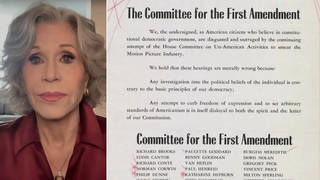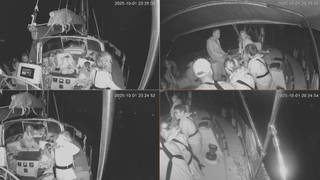
This July 4th, the Lexington Herald-Leader newspaper in Kentucky issued a front-page apology for failing to adequately cover the civil rights movement four decades ago. We speak with the author of the newspaper’s mea culpa and a retired social worker who took photographs of Lexington civil rights activism in the 60s that were ignored by the local papers and never published at the time in the Lexington Herald and Lexington Leader. [includes rush transcript]
On July 4th, a front-page article in Lexington Herald-Leader newspaper in Kentucky read: “It has come to the editor’s attention that the Herald-Leader neglected to cover the civil rights movement. We regret the omission.”
In a series of articles titled “Front-page news back-page coverage” the Herald-Leader issued an apology for failing to adequately cover the civil rights movement four decades ago. The correction marked both Independence Day and the 40th anniversary of the signing of the Civil Rights Act of 1964.
The mea culpa notes that the omissions by the city/s two newspapers, the Lexington Herald and the Lexington Leader, weren’t simply mistakes or oversights–The papers’ management actively sought to play down the movement.
As one former Herald editor put it: “The management’s view was that the less publicity it got, the quicker the problem would go away.”
The paper’s apology says that the inadequate coverage “hurt the civil rights movement at the time, irreparably damaged the historical record and caused the newspapers’ readers to miss out on one of the most important stories of the 20th century.”
- Linda Blackford, staff writer for the Lexington Herald-Leader who researched and wrote the paper’s apology.
- Calvert McCann, retired social worker, took photographs of Lexington civil rights activism as a high school student—some were recently published in Herald Leader.
Transcript
AMY GOODMAN: We’re joined by Linda Blackford, a staff writer for the Lexington Herald who searched and wrote the apology. How did you begin your research and what was the turning paper where the paper 40 years later said we got it wrong?
LINDA BLACKFORD: Two things happened. We were doing research for coverage of the 50th anniversary of the Brown v. Board Ed. decision and we can’t find any stories in the archives about what had happened locally. About that same time, John Carroll gave a speech at an editor’s meeting talking about corrections. He was sort of joking, but he said that the Herald, we should have run this correction, The Herald-Leader neglected to cover the civil rights movement. Our project director said what do you think about this, and we sort of started talking about it. And the story was born. So, we started talking to former reporters and civil rights demonstrators who were still in town, and that’s how we got started.
AMY GOODMAN: And what does it mean to say that you didn’t cover it at all?
LINDA BLACKFORD: Well, I think that maybe that’s a little strong. There was coverage of big marches. It was offered like a police report. It was covered only when people were arrested. Or when there was some kind of a complaint about it. The ideas of why these young people were demonstrating was completely ignored. The sort of larger hopes of the group and what they were trying to change was completely ignored. Everything was geared toward arrests and sort of public unrest.
AMY GOODMAN: We’re also joined on the line by Calvert McCann, retired social worker who took photographs of the Lexington civil rights activism as a high school student. Were they published at the time?
CALVERT MCCANN: No. They weren’t published — well, some papers outside of Lexington published them. The Louisville Kentucky paper and I think the Pittsburgh Courier may have carried some articles, and some of my photos.
AMY GOODMAN: What would they say at the time when you would bring the photographs over, or did you even bother? Did you see it as simply the white paper in town that wasn’t going to cover this? CALVER McCANN: No, I was aware at the time. I was part of the demonstration and demonstrators. We were aware they didn’t cover it, and we never attempted to show them the photographs or anything. I just photographed them for my friends and myself.
AMY GOODMAN: Can you describe the scenes that you photographed?
CALVERT MCCANN: Mostly people marching down the Main Street of Lexington, sitting in at the stores. Prayer vigils in front of the White House, and children and ministers participating and women in the movement here. And of James Farmer and when he would come to speak. He was the head of the corps at the time.
AMY GOODMAN: And Martin Luther King.
CALVERT MCCANN: Yes, and Martin Luther king when we had a march in Frankfurther, Kentucky, the state capital.
AMY GOODMAN: You have published now some of these photographs in the paper; is that right, Linda Blackford?
LINDA BLACKFORD: That’s right. We did a page of photos. We did the photos with the stories. We did a page of photos. The response has been overwhelming to say the least. I think people are stunned to see the vibrancy of the movement that was going on at the time, and it’s all thanks to Calvert.
CALVERT MCCANN: Yeah. A lot of people were unaware that we had a local civil rights movement, and I think in part because of the lack of coverage of the Herald-Leader.
AMY GOODMAN: What do you think Calvert McCann, would have happened if the local main newspaper — if the Herald Leader, had covered the civil rights movement? Do you think it would have been larger in the town? Do you think more people would have joined?
CALVERT MCCANN: I think there may have been more people would have joined, and more interest in the movement, but I really don’t think that it may have had that much of an impact, because the paper reflected the general opinion, you know, white population in Lexington, the views of the population.
AMY GOODMAN: Linda Blackford, you write about how in fact Lexington, Kentucky, was ahead of the curve in the civil rights movement, though you wouldn’t know it from the Herald-Leader.
LINDA BLACKFORD: That’s right. A local University of Kentucky historian found corps reports that showed there were sit-ins at a restaurant near the University of Kentucky in 1959, which is ahead of the Greensboro sit-ins, but nothing was ever mentioned in the paper, and people basically didn’t know anything about it until this professor found it.
AMY GOODMAN: What kind of response are you getting around the country to your correction?
LINDA BLACKFORD: It has been really overwhelming. Just emails and, phone calls from everywhere, just people really pleased, really interested in this kind of story. It makes me wonder since I think that the majority of southern newspapers sort of had the same attitude. A lot of southern newspapers had the same attitude as the Herald-Leader. It’s interesting that people are just so interested in this kind of thing.
AMY GOODMAN: Do you see something similar happening today when it came to the anti-war movement leading up to the invasion? I mean fairness and accuracy in reporting; did a study of the four major nightly newscasts, NBC, CBS, ABC, and PBS’s newscast with Jim Lehrer, in the three-week period around the war and the Colin Powell address at the U.N., only three of 400 with anti-war representatives, do you see parallels?
LINDA BLACKFORD: I do see parallels. I cannot speak for the national media, but I know that the people here who were running the newspaper felt like they were doing it in the community’s best interests, and I think in interviews that I have heard from representatives of the media, they say they were trying to be patriotic and support the nation in a time of extreme stress. I think that’s exactly what it was here, but the problem in my opinion is that then you’re actually kind of controlling the news rather than just covering it.
AMY GOODMAN: I want to thank you both very much for being with us. Linda Blackford, staff writer for The Lexington Herald-Leader and Calvert McCann, a retired photographer who took photographs of the civil rights movement as a high school student.












Media Options